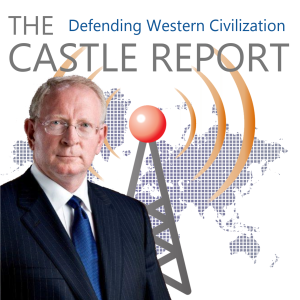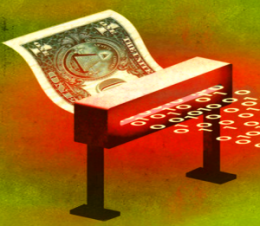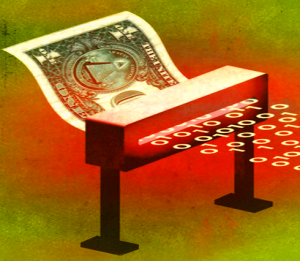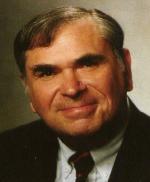
Destruction of Western Civilization: The End of Cash
 Hello, this is Darrell Castle with today’s discussion. We are continuing our series on Western Civilization, its destruction, and what that means for us today.
Hello, this is Darrell Castle with today’s discussion. We are continuing our series on Western Civilization, its destruction, and what that means for us today.
In last week’s episode, we talked about “financialization,” and how banks have used up all their money-printing and credit-bubble weapons in an effort to stave off the deflationary collapse in asset values that they have caused. In closing last week, I posed a question referring to central banks: What else can they do? Today we are going to discuss the answer to that question – the last nail in the coffin of Western Civilization, and the opening of the door to total government. Fascist tyranny will be the elimination of cash. I believe the criminalizing of cash and the introduction of a cashless monetary system in almost here. There is much evidence to support my view. On January 22nd, the largest bank in Norway, DNB, called for the complete and total elimination of cash. Many of their local branches have already stopped dealing in cash, and the same thing is happening in Sweden and Denmark, as well, according to the International Business Times. The idea is being sold as something that will be really good for Norwegian society. Eliminating cash, it’s claimed, will help authorities crack down on criminal activities such as terrorism, drug trafficking and money laundering.
Of course, the banks are all in favor of it. Without cash, every member of society would be forced to use the banking system for every single financial transaction. Bank “runs” would be eliminated, and the bank would collect a fee on every single transaction. A business student and DNB executive was quoted as saying, “There are so many dangers and disadvantages associated with cash, that we have concluded it should be phased out.” He estimates that 60 percent of all money is currently held outside bank control. So bank deposits would increase tremendously, as would bank profits.
The governments of the world are very excited about all this, the end of cash, because they are desperate. Reports coming out of the recent Davos meeting of the world’s most powerful people, show depression and desperation, in light of the central bank’s inability to keep the world from sinking into depression. In addition, no financial transaction would escape government taxation. Governments would be able to monitor and track everything much more closely. There would be no escape from bank bail-ins or, said another way, bank theft of your money. Confiscation of deposits is already legal in the United States, Canada and the European Union. Now, the same confiscation system that was used in Cypress a few years ago, can be used across the European Union. This would open safe deposit boxes to confiscation as well. Some countries already require the contents of safe deposit boxes to be revealed and recorded. Negative interest on deposits can also be expected which, said another way, is where the bank charges a percentage of interest instead of paying interest on your deposits. Negative interest rates could not exist in a free market economy. They could only exist in an economy created by central bankers. The assumption by government is that possession of cash indicates criminal activity as a result. This is becoming toxic to business. Many refuse to deal in it, as they are forced to become agents of the government, collecting government taxes and enforcing government vice laws.
The Economist Magazine, widely considered to be the economic voice for the world’s elite, has been predicting a world currency for years, including a recent issue with the cover, “Get Ready for a World Currency.” Naomi Klein published her book, Shock Doctrine, the Rise of Disaster Capitalism in 2007. That book has been very influential among such people since then. In that book Ms. Klein talks about the elites and the ultra-rich, and how they work behind the scenes to use shock to advance their agendas. Jim Rickards, author of The Death of Money, explains Ms. Klein’s theories like this: “Political leaders use crises to ramrod policies into place no one would accept in normal times. When the shock occurs, people begin to value order above liberty. The ‘shock doctrine’ begins with the fact that power elites have agendas that take decades, or even centuries, to implement. These agendas include things like world money, global taxation, control of physical goals, population control and other plans intended to increase power and wealth of the few, at the expense of the many.” Mr. Rickards goes on to say that “political elites are not fools. They understand their agenda is highly unpopular. They also understand that democracy empowers everyday citizens, and makes their unpopular plans hard to implement. This is where the ‘shock doctrine’ becomes useful.”
A shock can take many forms such as financial panic, terror attack or natural disaster that seems to come out of the blue, but it’s actually very predictable. When the shock occurs, people are fearful, and they look to their leaders for comfort. People begin to value order above liberty. At the critical moment, the elites are standing ready with their plan that will restore order, but, secretly, will advance their agenda to the next level. Financial panic as the next “shock doctrine” would be a good guess – or a good bet, if you’re a gambler. You could probably get odds on that in Las Vegas. Let’s look at the evidence. Central banks had 2 trillion dollars on their balance sheets two decades ago, but, now, they have 21 trillion! That’s a lot of debt for people and nations to carry. It’s a huge expansion of credit. The result has been a global debt-load expansion of 40 trillion dollars in the mid 90’s, to 225 trillion dollars today. There is no more room for credit, because everything has been over-invested, meaning we don’t need anything anymore, and we won’t need anything for many years. There is such a backlog. Just look at energy, and the way oil prices have declined due to overproduction. We can’t build or mine anything else because nothing else is needed. There is so much overcapacity that it spells recession on a global scale. The question is: Will this recession – or this depression – be orderly, or will it be violent?
Let’s take a look at what it means, and who we are now. I’ve certainly been wrong before, but a cashless global system is under construction, and it is just waiting for a shock. That shock is inevitable, but that doesn’t mean it’s eminent. However, a perfect time to perform it would be during President Obama’s last year in office. He’s a lame duck not up for reelection, and his successor, who will also be one of the ruling elite, will not be hurt by it. A cashless society will mean the end of privacy, because everything will be monitored. Everything will be watched. We will no longer prepare tax returns, because the government will know every penny we make, and where we spend every penny. Government computers will access our tax, and debit the amount from our accounts. The banks will of course profit from every single transaction under the auspices of “paying down our debts,” and our deposits, which will be everything we have, will be periodically tapped. Money will be declared the property of whichever government issues it. So it won’t belong to us, anyway. The state is therefore free to freeze – or confiscate – funds whenever it wants. Banks – with government approval – will decide how much of the money that you deposit will be returned to you.
What can we do about all this? Well, first, understand that we have lost the war. The counterculture has won the war. It’s a pyric victory for them, however, because, while they have been successful in destroying our culture, the rest of their world just might go with it. Unfortunately, there is not much we can do about it. If you have any money to speak of, consider real estate in some foreign country that you like to visit from time to time. Real estate doesn’t have to be deposited in banks. Other than that, is there any politician out there who can save us? I doubt it folks. That’s the way I see it.
I hope you’ve been enlightened by this series. Perhaps next week we can wrap it up. We’ll see how that goes. Until then, folks, this is Darrell Castle. Thanks for reading.



